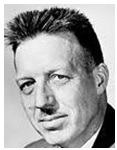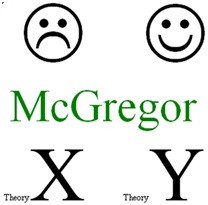|
 |
|
 |
Douglas McGregor, The Human Side of Enterprise (1960)
American professor (pictured right) at MIT's Sloan School of Management in Boston, USA, famous for his Theory X and Theory Y in this book. He died in 1964.
See also... Douglas McGregor in the Management Gurus section.
Book summary
Theory X and Theory Y These are two ways of looking at people at work - see below.
Theory X Theory X is based on assumptions associated with F.W. Taylor’s (pictured right) scientific management:
Theory Y Theory Y is is based on these assumptions:
a) people will motivate themselves to work (if they are fulfilled, autonomous and involved in decision making).
b) they have the ability to be creatively brilliant (but this potential is usually never fully realized).
c) they can accept responsibility and become leaders “The price of freedom is responsibility”, says McGregor.
Theory Y strategies 1. Management by objectives
2. Employee participation (in decision making) 3. Creating trust and confidence in managers (through their integrity and ethical behaviour). Theory Y won’t work if managers are seen to be manipulative.
4. Empowerment (although McGregor didn’t use the term) Central to Theory Y are:
5. Learning
6. Creative teamwork This results from:
Theory X strategies 1. Supervision and autocratic control People must be “coerced, controlled, directed, threatened”.
2. Carrot and stick motivation Financially reward and punish people for good and bad performance.
What about leadership and management? Leadership is a complex two-way relationship between the leader and his (or) her situation, particularly:
McGregor generally supports Theory Y But he says that it isn’t appropriate in every management situation. Theory X will be better if quick, autocratic action is required.
Key quotes on leadership and management Theory Y assumes that people will exercise self-direction and self-control in the achievement of organizational objectives to the degree that they are committed to those objectives. Theory X leads naturally to an emphasis on the tactics of control. Theory Y, on the other hand, leads to a preoccupation with the nature of leadership. The central principle of managerial control is the principle of self-control.
Key quote on innovation Theory Y is an invitation to innovation.
Key quote on motivation So long as the assumptions of Theory X continue to influence managerial strategy, we will fail to discover, let alone utilize, the potential of the average human being.
Key quote on management training Managerial competence is created on the job, not in the classroom. |
|
|
||
|
|
|
||
|
||
| Copyright © wisdomtowin.com All Rights Reserved | ||
|












